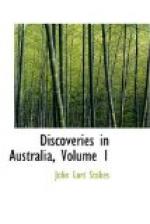A sealer had established himself on the north island with two wives, natives of Tasmania. They were clothed in very comfortable greatcoats made of kangaroo skins, and seemed quite contented with their condition. Their offspring appeared sharp and intelligent. In another part of my work I shall touch more fully on the history of these sealers, who style themselves Residents of the islands. They further distinguish their classes by the names of Eastern and Western Straits-men, according to the position of the islands they inhabit.
The sealers on New Year Island had a large whaleboat, which I was somewhat puzzled to know how they managed, there being but one man among them. He informed me, however, that his wives, the two native women, assisted him to work the boat, which had been well prepared for the rough weather they have to encounter in Bass Strait by a canvas half-deck, which, lacing in the centre, could be rolled up on the gunwale in fine weather.
THE MUTTON BIRD.
The principal occupation of these people during this month of the year is taking the Sooty Petrel, called by the colonists the Mutton Bird, from a fancied resemblance to the taste of that meat. It is at the present month that they resort to the island for the purpose of incubation. They constitute the chief sustenance of the sealers, who cure them for use and sale: their feathers also form a considerable article of trade. Many parts of the island were perfectly honeycombed with their burrows, which greatly impede the progress of the pedestrian, and are in some cases dangerous from snakes lying in them. The sealers told me that they had lost a cat which died within an hour after the bite of one of these reptiles. We here found cabbages and water, and the people informed us that it was always their custom to plant a few vegetables on the islands they frequented.
From the top of this island we had a good view of the Harbinger reefs, so-called from a convict ship of that name which was lost upon them and all hands perished. I was glad to find they were only two detached rocks lying three miles and a half from the shore, instead of, as reported, one continued reef lying six or seven miles from the land. They bore north six miles from our position.
CAPTAIN SMITH.
The sealers informed us that a house which we descried in the bay, was occupied by a gentleman who had met with a reverse of fortune. We accordingly paid him a visit next morning, and found that he was a Captain Smith with whom the world had gone wrong, and who had accordingly fled as far as possible from the society of civilised man and taken up his residence on the shores of King Island with his family. He had given the name of Port Franklin to the bay, which we changed to Franklin Road, from its not being worthy of the title of a Port. He was led to choose his position from its being in the neighbourhood of the only secure anchorage from all winds, and near




